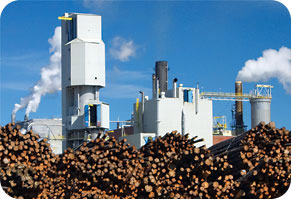Pulp & Paper Testing
The wood products / pulp and paper industry requires specialized environmental testing and analysis services. These tests include resin and fatty acid analysis, speciation of total reduced sulfur (TRS) components, chlorinated by-products of the pulping/bleaching process, and MACT and Cluster Rule analyses. In addition to the above services, ALS - Columbia provides conventional compliance monitoring and conventional and "clean" sampling procedures for the pulp and paper industry.

Trusted Expertise in the Pulp & Paper Industry
ALS - Columbia supports environmental programs for the pulp and paper industry. We participate in wood product and pulp and paper industry organizations such as the National Council for Air and Stream Improvement (NCASI) and the Recycled Paperboard Technical Association (RPTA). Our client list includes more than 63 pulp, paper and wood industry companies for which we have performed work at more than 150 specific mills throughout the country. Analytical project involvement includes routine National Pollutant Discharge Elimination System (NPDES) testing; influent and effluent water chemical and biological characterization; hazardous waste analysis; air quality analysis in support of the Clean Air Act; groundwater and landfill monitoring; and process and product chemical characterization, including analysis of sludges, liquors, boiler ash, and finished products.
Cluster Rule Compounds and Chlorinated Phenolics
ALS - Columbia has extensive experience in the analysis of adsorbable organic halides procedure (Method 1650 C) and the chlorinated phenols procedure (Method 1653 A) as required under the scope of analyses for organic compounds for the pulp and paper industry (Cluster Rules). ALS - Columbia was one of five laboratories that contributed to the method validation studies sponsored by the EPA and NCASI, West Coast Regional Center, under the SAS contract (COLUMB-0135) for EPA Method 1650 (Adsorbable Organic Halogens) and EPA Method 1653 (Chlorinated Phenolics by In-Situ Acetylation). The laboratory also provided input on method deficiencies. Work under that contract required meticulous adherence to quality assurance/quality control (QA/QC) as well as strict data documentation and reporting procedures. The laboratory's data were judged among the best for the Method 1653 validation studies. Approximately 80 percent of the data used in the original study originated in our Kelso, Washington, laboratory. Since 1995, ALS - Columbia has performed thousands of Cluster Rule analyses.
Recycled Paperboard Technical Association
In 1995, ALS - Columbia began working with the Recycled Paperboard Technical Association (RPTA) to help establish experimental protocols to examine possible migration of compounds from recycled paperboard products to food. In 1998, the RPTA established guidelines for testing food-contact paperboard made from recycled paper and, after a careful review of laboratories, named ALS - Columbia the preferred laboratory for this testing. In addition to these tests, ALS - Columbia also performs FDA extractions specified in the Code of Federal Regulations (CFR) and bacteriology testing for our RTPA clients.
On-Site Sampling Services
ALS - Columbia provides daily, monthly, quarterly, semi-yearly, and annual on-site sampling services for some pulp and paper clients. This sampling includes process stream sampling and routine compliance sampling by conventional sampling protocols as well as "clean" sampling protocols when needed.
Sampling is conducted in compliance with National Pollutant Discharge Elimination System (NPDES) permits, Safe Drinking Water Act (SDWA) permits, Cluster Rule regulations, and other regulatory programs. "Clean" sampling is performed when the regulating state has set NPDES metals limits at very low levels and is designed to minimize all conditions that may lead to contamination during sampling.